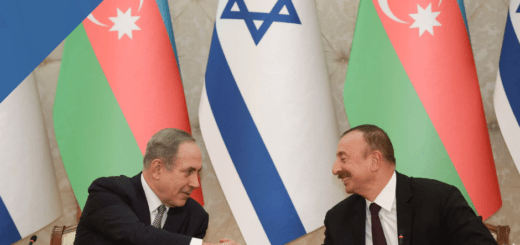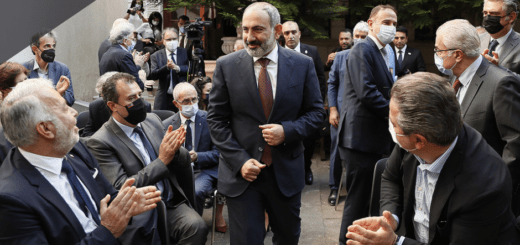Russia-Ukraine War: This is What Happens When Compromise is not Achieved
By Harut Sassounian
What is happening right now in Ukraine is the worst possible scenario
for both sides, in fact all sides.
First of all, this is an enormous tragedy for the people of Ukraine
who have fallen victim to the Russian invasion which should have been
avoided at all costs. No one can justify the destruction of a country
and the killing of innocent people. We should support peace, common
sense and safety of all human beings.
Let us ignore the unrelenting propaganda, misinformation,
disinformation and hypocrisy which have inundated the media before and
during the war. No need to play politics or partisanship with people’s
lives.
Let us now move from emotional statements to the real world which can
only be ignored at our own peril. Since the beginning of the world,
the powerful has always imposed his will on the weak. There is no
escape from this. It has always been this way and will continue to be
this way. All those who believe in truth and justice are sadly
mistaken. They live in a make-believe world.
Russia, as a powerful country, felt that it was being threatened by
Western powers encroaching on its sphere of influence and wanted to
protect its national interests. Whether we agree or disagree with the
Russian view is immaterial. This is how the Russians perceive the
situation. And when you are a powerful country, right or wrong, you
try to impose your will on others, one way or another. The precedent
for this situation is the Russian invasion of the Republic of Georgia
in 2008 when the latter flirted with the idea of joining NATO. Russia
occupies large parts of Georgia to this day.
Those in the West who have been making sanctimonious statements about
big bad Russia attacking an innocent country are conveniently
forgetting how the western countries themselves behaved for decades,
even centuries. The imperial powers of the United Kingdom, France,
Spain, Germany, and Italy went around the world conquering dozens of
smaller, poorer and weaker countries, subjugated them, plundered their
natural resources, killed and wounded hundreds of thousands of
natives, until they rose up and tossed the aggressors out.
The United States, the self-declared paragon of democracy and human
rights, has attacked and occupied several countries in the past
imposing its will around the world. The U.S. government has overthrown
many leaders who have refused to toe its line and submit to America’s
wishes. There are dozens of such examples, the latest of which is
Iraq. Who can forget the Cuban Missile Crisis in 1962, when the Soviet
Union deployed nuclear missiles in Cuba, just 90 miles away from the
United States? The two countries came to the brink of nuclear war on
that occasion. There is also the long-standing U.S. policy of the
Monroe Doctrine which states that any intervention in the political
affairs of the Americas by foreign powers is considered a hostile act
against the United States. How is this different from Putin’s
interpretation of Russia’s sphere of influence in Eastern Europe,
including Ukraine? Finally, Pres. Biden’s actions against Russia are
partially prompted by his intent to raise his record low rating of
37%. The latest Washington Post/ABC News poll showed that only 33% of
Americans approve Biden’s handling of the Russia-Ukraine crisis, while
47% disapprove.
It would have been preferable to engage in direct negotiations between
Russia and Ukraine to find a peaceful solution to the crisis. As it is
often said, “war is diplomacy by other means.” The more outside powers
such as the United States, France and the United Kingdom meddled in
this dispute, the worst it got, since each of these countries,
pretending to defend Ukraine, were in fact pursuing their own
interests. The crux of the issue is the disagreement between Russia
and the West about an alleged pledge made by the West after the
collapse of the Soviet Union that NATO will not expand to Eastern
Europe, threatening Russia’s security. Nevertheless, NATO did expand
to several Eastern European countries, which Russia viewed as a
hostile act.
Russia decided to impose its will on Ukraine, fearing that if it did
not act promptly, Ukraine would join NATO, after which it would be
impossible to neutralize the perceived danger, due to the NATO policy
of “attack on one member country is deemed an attack on all.”
There should have been a compromise found on both sides to avoid war.
Most people thought that there would be no war and that Russia was
amassing troops on Ukraine’s border to pressure it to reach a
compromise solution. Regrettably, the Russian attempt to influence
Ukraine ended in a full scale invasion destroying large parts of the
country’s infrastructure and causing untold casualties. It could be
that Ukraine refused to compromise relying on Western assurances that
it would come to its aid militarily and economically, if it resisted
Russian demands not to join NATO. In addition to providing military
hardware and economic assistance, Western countries tried to block
Russia’s actions by issuing a series of draconian sanctions, which
failed to alter its decision. The hopeful news is that Russian and
Ukrainian delegations held their first direct talks on Monday and
agreed to meet again.
Turning to the effects on Armenia of the war and sanctions on Russia,
Armenia is caught in the middle of its alliance with and reliance on
Russia and its standing with the rest of the world. As they say, when
two elephants jostle, the ant gets stomped on, regardless of which
elephant wins.
The biggest problem that Armenia has is the absence of a competent
leader who would be able to come up with a skillful solution to
extricate itself from this extremely complicated situation. Since the
start of the war, Armenia’s Prime Minister Nikol Pashinyan has not
made an official declaration. Nevertheless, on three separate
occasions, Armenia has taken sides and made statements regarding this
conflict.
The most problematic action Armenia took was last Friday when the
Council of Europe voted to suspend Russia’s membership in the
Parliamentary Assembly of the Council of Europe and the Committee of
Ministers. Armenia was the only country that voted with Russia against
the measure. Forty two countries voted yes. Turkey shrewdly abstained
and Azerbaijan did not vote at all. Western countries will not look
too kindly at Armenia’s support for Russia. Likewise, Russia will not
look too kindly at Azerbaijan’s and Turkey’s votes. The war in Ukraine
is sure to limit Turkey’s ability to walk on a tightrope between NATO
and Russia. Azerbaijan’s similar tightrope walk will also be curtailed
by not voting with Russia in the Council of Europe, thus undermining
the declaration of “allied cooperation” signed on Feb. 22 by Russia
and Azerbaijan.
Secondly, when Armenia’s Foreign Ministry spokesman, Vahan Hunanyan,
was asked if Armenia will join Russia in recognizing the
“independence” of the Ukrainian regions of Donesk and Lugnask, he
replied: “There is no such issue on [Armenia’s] agenda.” Putin will
not be pleased with that answer. He has many ways to pressure
Pashinyan to toe the Russian line in this crisis.
Finally, speaking at a meeting of the Eurasian Intergovernmental
Council in Kazakhstan on February 25, Pashinyan suggested that prompt
measures be taken “to minimize or circumvent” the anti-Russia
sanctions approved by the West following Russia’s invasion of Ukraine.
The anti-Russia sanctions are sure to have a major impact on Armenia’s
frail economy as Russia is Armenia’s largest trading partner. As they
say, when Russia sneezes, Armenia catches a cold. The $861 million
remitted in 2021 by Armenian workers in Russia to their families in
Armenia will be sharply curtailed due to the collapsing ruble and
increased unemployment.
There is also a long-standing controversy between Armenia and Ukraine.
Both sides accuse each other of betraying their trust and siding with
their enemies. In 2014, Armenia, along with nine other countries,
voted with Russia against a UN General Assembly resolution which
declared the pro-Russian Crimean referendum invalid. Armenians respond
by recalling that Ukraine voted in the General Assembly in 2008, for a
resolution demanding the withdrawal of “Armenian forces” from Nagorno
Karabagh. President Volodymyr Zelensky of Ukraine announced during the
2020 Artsakh war: “We support Azerbaijan’s territorial integrity and
sovereignty just as Azerbaijan always supports our territorial
integrity and sovereignty.” Furthermore, Ukraine sold lethal weapons
to Azerbaijan prior to the 2020 war.
One should not forget that there are around 500,000 Armenians who live
in Ukraine. When other countries shut down their embassies in Ukraine
and withdrew their nationals, the Armenian Embassy continued
functioning and Armenian nationals remained in Ukraine risking their
lives.
With each passing day, more innocent civilians are being killed in
Ukraine, more sanctions are being imposed on Russia and more ominous
threats are being issued. Common sense should prevail before the world
reaches a doomsday scenario.
The only solution is reaching a compromise through peaceful
negotiations. Eye for an eye and tooth for a tooth will leave everyone
blind and toothless.








Bravo, Mr. sassounian! Very clear discussion around Russian Ukrainian conflict and war, as well as Armenian wrong diplomacy regarding to it.